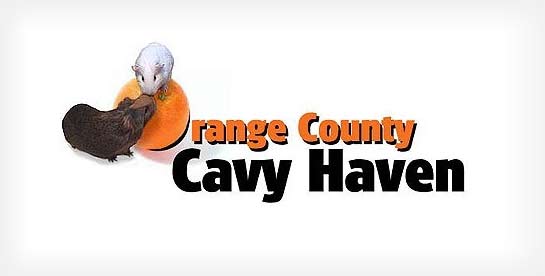
Orange County Cavy Haven Logo
wheek.it (WK): So let’s talk about some real-life challenges you’ve faced since you took on the role of CEO. How did you face those challenges? What was the outcome, Michiko?
Michoko Vartanian, Orange County Cavy Haven CEO (MV): Perhaps the biggest challenge, for me, is the emotional challenge due to the amount of sadness involved in the position. I am in contact daily with at least one person who has a sick pig, or has been involved in something upsetting regarding a guinea pig and is reaching out for help. In addition to the fact that there is at least one foster pig in the rescue at any given time who is dealing with an illness, I also am in contact with a great number of people who reach out to me whether or not they’ve rescued from us. I am always available to anyone who has questions regarding pigs, but the result is that I become exposed to so many sad stories. Probably a day doesn’t go by where my heart doesn’t break to some degree. I just try to balance that with the fact that my role also exposes me to all of the many, many happy stories, and I try to focus on those.
Follow This Interview
- Part 1: Guinea Pig Rescue Interview: Orange County Cavy Haven
- Part 2: Guinea Pig Rescue Interview: Orange County Cavy Haven (current)
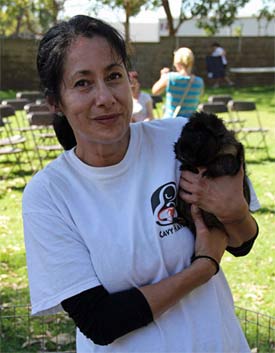
Michiko Vartanian CEO OC Cavy Haven [source]
Sadness and loss is something we all face as parents to these wonderful creatures with their too-short life spans. I just have to accept that [the hard work done by OCCH volunteers] also exposes me to a vast amount of losses. But I know from experience that not many people understand what losing our best friends and family members feels like, so the fact that people know that we at OCCH care and are here for them means a lot to me. And, of course, the reverse is that so many people whom I’ve never met also allow me to share in the joy their pigs bring to them.
WK: Then let’s focus on some happy stuff! How many guinea pigs has OCCH helped find Forever Homes?
MV: The numbers vary from month-to-month, of course, and the numbers have been increasing over the months as we’ve been able to expand our social media outreach. We’ve also increased our volunteer pool, which has allowed us to get more pigs to adoption events. I would put our average for the first several years that I volunteered with OCCH at anywhere from 2-8 guinea pigs per month.
Due to the fact that we don’t have a storefront, we don’t typically adopt out the amount of pigs that some other rescues adopt out. However, there are positive trade-offs to not having a storefront, including the fact that our pigs are constantly socialized in homes and our fosters are very familiar with their personalities and quirks, which can be helpful information to potential adopters.
Since we have been able to increase our size, and our ability to more successfully outreach, in recent months our average has jumped quite dramatically. I would put our average in the past 6 months at 20 guinea pigs per month.
WK: Where does most of your rescue’s funding come from?
MV: While we are able to meet our monthly expenses through our adoption fees, and the donations received from Supply Day, the bulk of our funds comes from donations from the public. Our major expenses are the supplies we provide to our foster homes and vet expenses. We are able to meet those expenses consistently by generous donors who make donations to our medical and general funds. If it weren’t for those donations, we would not be able to continue rescuing guinea pigs.
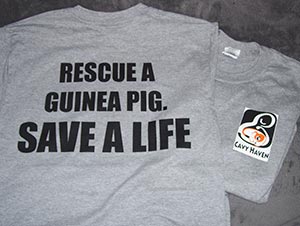
Rescue a Guinea Pig T-Shirt
The reality is that our average monthly vet costs far exceed our monthly income based on just our adoption fees and supply sales. Fortunately, we have been able to continue operating based on so many generous supporters and organizations like wheek.it pitching in to get the word out about guinea pig rescue.
WK: Then this begs the question: How do you attract your funding?
MV: Social media is the main way we fund raise. We get a lot of our donations based on fundraising posts.
WK: I know that Orange County Cavy Haven is really active on a number of social networks, including Twitter, Facebook, and Instagram. Do you also use social media to recruit volunteers?
MV: Yes! Social media is a great way to recruit volunteers. While volunteering in an animal rescue can be hard work, we have a great team of volunteers and we have a lot of fun at events. I get contacted quite often by people who have seen our posts about events and are interested in getting involved.
We also list volunteer help in various publications, as well as list our volunteer needs in our newsletter. We are always in need of volunteers, not just for events but for things like pulling and transporting pigs that we’re able to save from shelters, and we can definitely use people who sew!
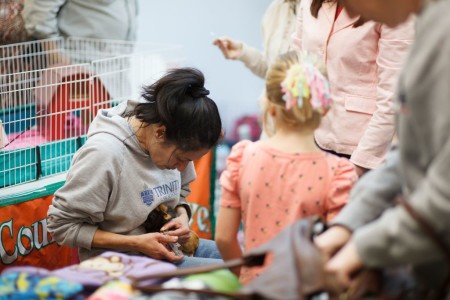
Volunteer Trims Guinea Pig Nails at an OCCH Event
Currently, I am doing the bulk of the sewing for the rescue as many people have started online stores and so there aren’t as many people available who can donate their time to sewing for charity. But if there are any people who sew and would like to help out the rescue, please let me know!
WK: Since we’re on the topic of volunteers, what have been some of OCCH’s top volunteer-run fundraising and adoption events during the year? Tell us a little about them.
MV: By far, our biggest fundraising event is the Pignic. We had our 3rd annual SoCal Pignic on June 30 at the Irvine Animal Care Center [in Irvine, CA]. The Pignic is not an adoption event, but rather a day to celebrate guinea pigs and their people. People come with their piggies and generally spend the entire time (12pm to 4pm) enjoying the day. We have two raffles, a silent auction, food, contests and prizes, a vet talk, and it’s just such a fun day. There is so much work that goes into putting on Pignic and, in fact, we began planning June’s event in January. However, it is so worth it. It is so fun to see so many piggy people and pigs having fun in one location and just celebrating guinea pigs and rescue, that the fact that it happens to be our biggest fundraiser is almost an afterthought.
The top adoption events are Pet Expo (held at the OC Fairgrounds each April), and Super Pet, held at the Irvine Animal Care Center each June. These are major adoption events where we have a booth alongside hundreds of other rescues, and we definitely notice a jump in adoptions after each event.
WK: What recommendaitons do you have for other guinea pig rescues who are struggling with fundraising, adoption out-reach, and recruiting volunteers?
MV: Avail yourself of any and all webinars on effective social media outreach. About a year ago, I took several webinars (you just have to be on the lookout for the free ones) and made some changes based on what I learned. Over the course of the next few months, our Facebook “Likes” jumped from about 1000 to almost 3000.
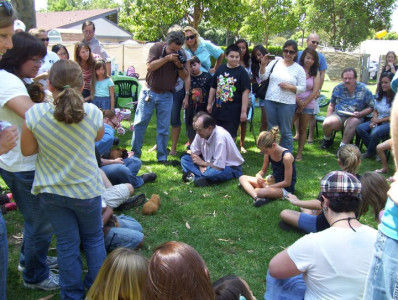
Orange County Cavy Haven SoCal Pignic 2012
Also, and perhaps even more importantly, never get too busy not to respond to emails and phone calls. Never miss the opportunity to help educate or to let people know that, if they contact you, they will not be ignored. Naturally, with an inbox as busy as mine, I can’t promise you that nothing has ever fallen through the cracks. But I try not to let that happen, because you never know what opportunities might present themselves and what might develop from an initial contact.
WK: I’m curious, with so many guinea pigs you help, what’s the worst guinea pig rescue situation you’ve seen or dealt with while at OCCH? What happened to the guinea pigs that were rescued?
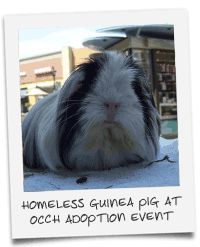
MV: There have been so many “worst” situations, that it would be impossible to choose just one. The hoarder dumps are always difficult. For instance, I recently got contacted by a location shelter informing me that they had a large number of pigs dumped on them and asking whether we could help. Between OCCH and the Bunny Bunch, we were able to find room for all of the cavies. However, due to the ongoing investigation, the pigs cannot be released yet. We are anxiously waiting to get the call that those pigs can be released. It is so difficult to think of them all (many mothers with young babies) being kept in the shelter instead of in our loving foster homes being showered with veggies and care. I know that the shelter is staffed with good people who care about those pigs, but I also know that it is a stressful environment for those pigs and they will be much healthier and happier in our foster homes. Furthermore, the sooner we get them, the sooner we can find them loving homes. There are other painful and difficult situations that present themselves on a daily basis.
Instead of talking about the awful details of some of them, I guess I’ll just say that we do whatever we can to always make sure a guinea pig who crosses our path ends up with a happy ending.
WK: That’s it! Let’s keep this light-hearted. So, now that we know about OCCH and what it takes to run a rescue, in 10 years, what do you hope others will have to say about your time at OCCH?
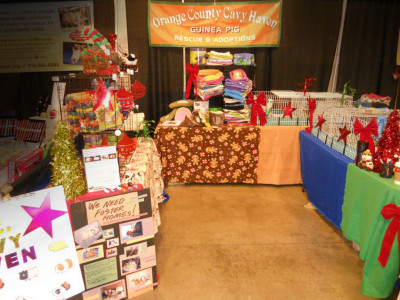
Orange County Cavy Haven Adoption Event
MV: This might sound strange, but I hope that in ten years, people will see OCCH as a team of volunteers equally valuable and important in their own ways, and if they think about my time here at all, it will be just as another volunteer wanting to do whatever I can to help rescue guinea pigs. We have so many wonderful people donating their time to help OCCH. I firmly believe that nobody’s time or efforts is more valuable than anybody else’s.
We have some volunteers who are able to devote more time than others, but that doesn’t mean that those who are able to devote less are any less valuable in the scheme of things. These animals need all of the help they can get. All of our volunteers are so dedicated and give so much of themselves to help guinea pigs. If in 10 years people saw me as being one member of the team of awesome OCCH volunteers, it would be an honor.
(The end.)
Get In Touch With Orange County Cavy Haven
Looking to adopt? Want more information on how you can help OCCH help homeless guinea pigs in Southern California? Hit the links below!
Follow This Interview
- Part 1: Guinea Pig Rescue Interview: Orange County Cavy Haven
- Part 2: Guinea Pig Rescue Interview: Orange County Cavy Haven (current)

